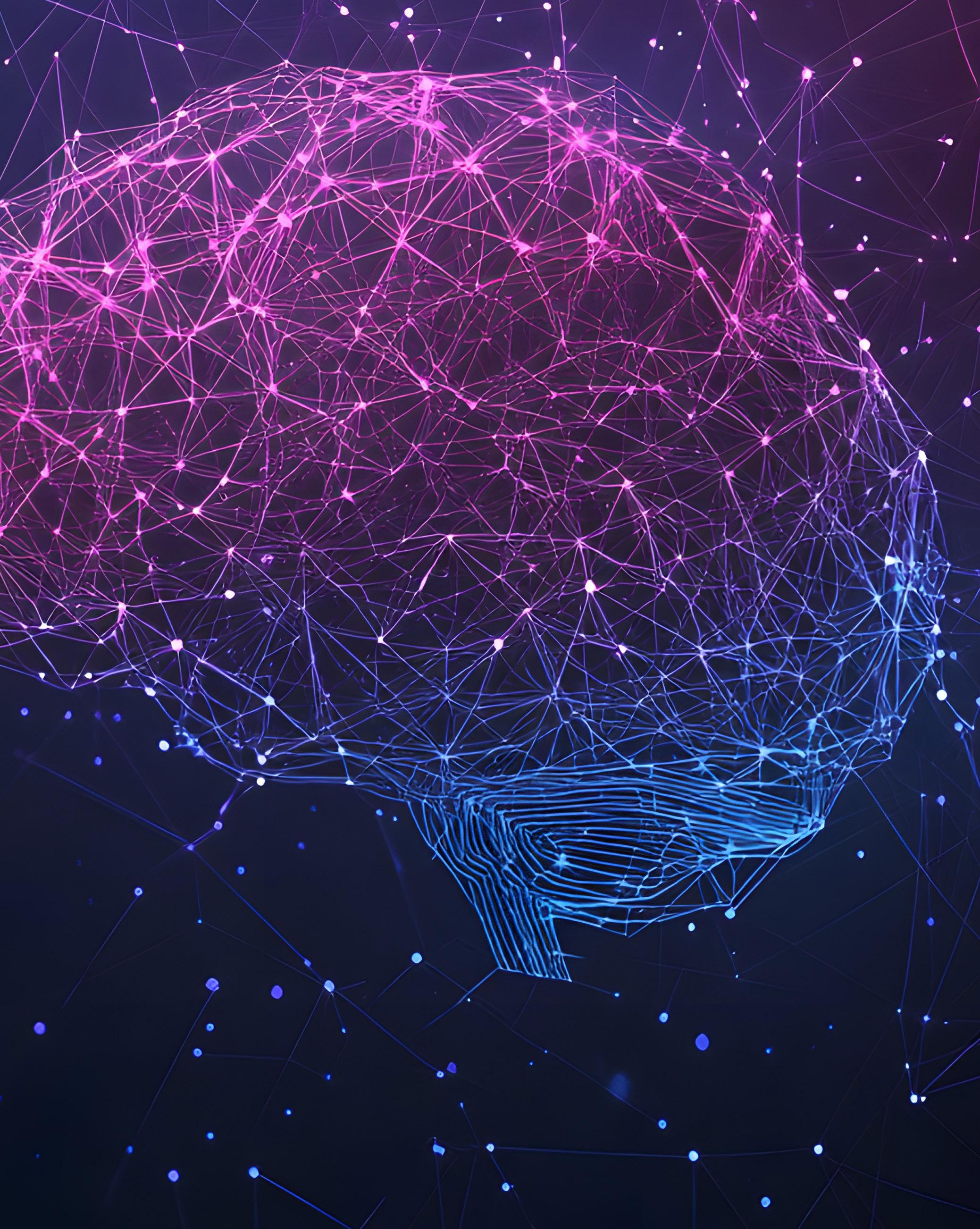






Old Dominion University (ODU) leverages artificial intelligence (AI) for societal impact by integrating AI into our teaching, research, and operational environments. We focus on ethical AI to enhance human capabilities, foster innovation, and prepare our community for the future of work. This effort across our institution has led to a centralized collaborative of experts who are mindfully weaving AI into the fabric of the University.
ODU is committed to preparing students for the AI-driven future by providing them with the necessary skills and knowledge to succeed in the evolving job market.
ODU is at the forefront of shaping the future of AI in academia by developing innovative solutions and embracing AI in administration, which will drive the next generation of business operations.
ODU is committed to becoming a leader in AI by fostering innovation, collaboration, and research within the University and with industry partners.


Brian O. Hemphill, Ph.D. President, Old Dominion University
At Old Dominion University (ODU), artificial intelligence (AI) is not an isolated initiative – it is the strategic core of our digital transformation. As higher education navigates unprecedented technological change, ODU is leading the way with a centralized, institution-wide AI strategy that is integrated across all areas of the University’s mission.
This strategy is bold, practical, and deeply aligned with our Forward-Focused vision. It positions AI as a catalyst for improving teaching, advancing research, and enabling smarter, more responsive operations—all while maintaining a strong ethical foundation and public service orientation.
Unlike many institutions where AI efforts are fragmented, ODU has developed a cohesive, forwardlooking approach that unites innovation across the University. This unified AI framework is organized around three integrated pillars:
Empowering faculty and students with AI-integrated curricula, generative tools, and digital fluency:
Through programs like the AI Teaching Fellows, microcredentials, and intelligent learning assistants, ODU is preparing graduates to thrive in AI-powered workplaces.
Redesigning the University experience with AI-powered platforms that enhance efficiency and service delivery:
Tools like MonarchMind and AssistNOW improve faculty and staff productivity while protecting data privacy and upholding ODU’s commitment to responsible AI.
Accelerating interdisciplinary research through cutting-edge AI tools, strategic partnerships, and new research pathways:
Faculty leverage platforms like Vertex AI, GrantAI, and NotebookLM to explore solutions in healthcare, maritime systems, education, cybersecurity, and beyond. page 8 page 18 page 26



At ODU, we are enhancing and expanding our educational offerings to prepare students for the future of AI by offering new AI courses, workshops, credentials, certificates, and research opportunities to help students build the skills they need to succeed in the AI industry.
As we partner with industry leaders to provide students with real-world experience and training, our students gain hands-on experience in the AI industry.
By creating high-tech and high-touch opportunities to experience AI, our students have access to new AI-focused certificates and courses, rooted in technological literacy, preparing them for an increasingly digital and interconnected workplace.
AI does not change the fundamentals of our degree programs, but by implementing these courses and programs, we foster a continuous learning environment to shape and upskill both students and professionals.
AI assists students in brainstorming ideas, creating outlines, and drafting essays. We teach students to write prompts that are tailored to a specific subject in order to maintain relevance, while ensuring that the final submission is a student’s own work.
Educators use AI to develop quizzes, lecture notes, and multimedia resources to support traditional teaching methods and enhance material retention through quick checks and reflections.
AI tools summarize articles, identify relevant literature, and suggest research questions. AI complements (not replaces) rigorous research practices, promoting deeper engagement with structured research assignments.
Instructors design activities and assessments that prompt students to critically evaluate AI-generated content and compare outputs with traditional research methods to foster analytical skills.

ODU has expanded its educational offerings to cater to the growing demand for AI-related programs and courses, providing students with the knowledge and skills that are in high demand in today’s job market by hiring new faculty with AI expertise across all disciplines.
ODU offers AI-focused certificates for both professionals and students. These certificates are designed to provide specialized training, expertise, and skills in the field of artificial intelligence.
Certificate programs launched in Spring 2025
• Trustworthy AI (School of Cybersecurity)
This online certificate program combines AI and machine learning with cybersecurity and privacy, two of the fastest growing areas in technology. Students gain a solid understanding of how to develop AI systems responsibly and ethically.
• AI in Data Science (School of Data Science)
This program, designed for recent graduates or entry-level data scientists and data analysts, offers an introduction to AI in data science, including machine learning methods for analyzing vast datasets.

Certificate programs for Fall 2025
• AI in Cyber Defense
• AI in Healthcare
• AI in Supply Chain Operations
Certificate programs for Spring 2026
• AI in Business Strategy and Operations
• AI for Digital Content Management
• AI in Education and Learning Technologies
• AI in Literacy

‘‘ AI doesn’t replace teachers or fundamentally transform how we teach. The fundamentals are still there, but the use of AI helps us be more efficient in our work. As an instructional design professor, I have the responsibility to introduce AI. ‘‘
Tian Luo, Ph.D., Associate Professor Department


‘‘
Advancements in AI tools and algorithms empower cybersecurity to perform autonomous threat detection and achieve real-time defense. Conversely, cybersecurity safeguards AI systems, ensuring their integrity as they evolve. As a researcher, I aim to combine both to create a powerful synergy in security digital infrastructure.
‘‘
Md Morshed Alam, Ph.D., Lecturer School
Cybersecurity

ODU is partnering with industry to provide non-credit certificates, enabling students to gain specialized skills and knowledge that enhance their employability in the workforce.
Foundational Google Career Certificates
• Cybersecurity
• Data Analytics
• Digital Marketing and E-Commerce
• IT Support
• Project Management
• User Experience (UX) design
Advanced Google Career Certificates
• Advanced Data Analytics
• Business Intelligence
• IT Automation with Python
Google Courses
• Agile Essentials
• AI Essentials
• Prompting Essentials
ODU’s industry-academia partnerships include workforce training, which helps students and employees develop the skills and knowledge necessary to succeed in the workforce or reskill to keep up with the demand for new skills.
These partnerships include organizing workshops, hackathons, and other events that help students, faculty, and staff learn about the latest industry trends and technologies.

Central to ODU’s AI strategy is a strategic partnership with Google, which provides technical expertise, advanced AI tools (Gemini, Vertex AI, and AgentSpace), and co-development support through its Rapid Innovation Team. This partnership powers the creation of secure, mission-aligned projects and tools and enables scalable operations, research, and instructional innovation.
Through this unified and future-focused approach, ODU is not only adapting to technological change, it is shaping the future of higher education.

ODU has established a multi-year strategic partnership with Google to drive its vision for ethical, scalable, and institution-wide AI transformation. This partnership provides a powerful foundation for advancing AI across teaching, research, and operations through access to cutting-edge infrastructure and intelligent tools.
Through this partnership, ODU leverages Google Cloud platforms to:
• Build scalable AI agents using AgentSpace;
• Support course design and research productivity with NotebookLM;
• Accelerate research funding opportunities using GrantAI;
• Provide students and professionals with AI-aligned credentials through Google Career Certificates; and
• Power campus-wide experimentation with Vertex AI and Gemini, Google’s family of large language models (LLMs).
ODU’s partnership with Google is not just about tools – it is about transformation. Together, the University and Google are enabling a secure, ethical, and future-ready ecosystem for applied AI innovation.
The ODU AI Incubator, launching Summer 2025, is the University’s flagship hub for applied AI development and testing. Powered by the Google Cloud infrastructure, the Incubator will serve as:
• A sandbox for AI agent development across learning, advising, administration, and research;
• A testbed for personalized AI tools, including LMS-integrated copilots and career pathway advisors;
• A regional accelerator for community, public sector, and industry partnerships; and
• A credentialing and workforce platform, integrating Google Skills Boost and microcredential pathways into academic and continuing education programs. The incubator is the heart of ODU’s applied AI strategy – grounded in infrastructure, ethics, and scalability. It is where innovation becomes implementation.

The AI Teaching Fellows Program is a cornerstone of ODU’s academic innovation strategy, empowering faculty across disciplines to integrate AI meaningfully into teaching and learning. Fellows represent high-impact areas, such as healthcare, cybersecurity, business, and education, and are actively shaping the next generation of AI-enhanced academic programs.
The Division of Digital Transformation and Technology collaborates with faculty to design and deliver AI-integrated courses, microcredentials, and instructional experiences. Fellows work closely with instructional designers, technologists, and multimedia specialists to:
• Leverage AI for content generation, media production, and design efficiency;
• Implement MonarchMind, ODU’s secure generative AI platform, as part of course development and delivery; and
• Use MonarchMind within courses, allowing learners to responsibly engage with GenAI tools in context.
Fellow-led projects serve as prototypes for future deployment across academic programs and Continuing Education offerings. Their work is helping define ethical frameworks, pedagogical practices, and scalable approaches to AI in curriculum. This program embodies ODU’s commitment to teaching with AI at scale and in practice.


ODU also intends to build its reputation as a national leader in key research areas by recruiting and hiring 25 faculty members with expertise in artificial intelligence. These individuals will be hired in clusters to align with current institutional strengths in the following areas:
• Accelerator Science, Engineering, and Machine Learning;
• AI-Infused Connected/Autonomous Systems for Medicine and Health;
• Data Driven Artificial Intelligence in Special Education;
• Medical Modeling Simulation: Precision Medicine and Patient Safety;
• Shipbuilding and Ship Repair: On-Demand Manufacturing, Supply Chain/Manufacturing 4.0 and Shipyard Digitization Team; and
• Trustworthy Artificial Intelligence.
This is the first stage of the Centennial Cluster Initiative, which aligns with the University’s strategic plan, “Forward-Focused: Where Innovation Meets Possibilities,” to increase the number of talented and diverse research leaders as ODU approaches its centennial anniversary in 2030. These faculty members will support the expansion of transdisciplinary research efforts.
‘‘ Using AI on assignments has the potential to make interactions more personal because there are more stages and more touch points with the professor. When done well, you are actually getting more feedback and interactions with your students thanks to AI. ‘‘
Ryan Baltrip, Ph.D., Clinical Assistant Professor Department of Marketing

The integration of ethical AI into society demands deliberate discovery and decisive action to establish robust regulatory frameworks that protect intellectual property and human rights.
At ODU, our research is both holistic and collaborative, addressing real-world challenges, while delivering scalable, impactful solutions. By embedding AIdriven autonomous systems into key sectors, like healthcare, maritime, and coastal resilience, we are meeting the evolving needs of our community and workforce.
In higher education, AI is a powerful tool to revolutionize operations, enhance student support, and close equity gaps.
ODU is committed to empowering underrepresented populations with practical AI skills, shaping the future workforce and driving transformative impact across the region.

‘‘ I
emphasize to students the need to be critical thinkers. I want them to be creative in their problem-solving abilities. Somehow AI visualizes their thinking process. The prompts they give and how they interact with GenAI tools could show and enhance their decision-making process.
‘‘

Xinyue
Ren, Ph.D., Assistant Professor


ODU is using AI to enhance student and faculty support services, improving student experiences and faculty productivity. AI will also support the work and services of staff across the institution.
We are integrating AI into curricula by creating interactive learning environments that allow students to engage with AI-based systems and develop critical thinking skills.
We are able to provide 360º support for students, capturing mass amounts of data for effective personalization. By capturing and tracking behavioral data, we are able to offer accessibility enhancements, early alerts and tutoring, and personalized learning pathways.
We also provide 360º support for faculty that includes virtual assistance, curriculum planning and course development, interactive activities, innovative course materials, and enhanced student engagement.
ODU incorporates AI into everyday business processes, leveraging the power of the tool to maximize operational efficiencies.
From marketing to admissions to advising and beyond, ODU is incorporating AI into the administrative offices responsible for supporting the student experience.
With a keen focus on automation of routine tasks and virtual support from a robust knowledge base, staff will experience reduced burdens allowing the institution to redirect resources to more strategic initiatives.
MonarchMind is ODU’s flagship generative AI platform, designed to provide faculty and staff with a secure, private environment to explore the power of artificial intelligence – without compromising academic integrity or data privacy.
MonarchMind seamlessly integrates multiple large language models, including OpenAI’s ChatGPT, Google Gemini, and Meta’s Llama 3. Combining the strengths of these systems, MonarchMind offers a unified space for generating text, analyzing data, and processing files. It is FERPA-compliant, purpose-built for education, and aligned with our values of equity, security, and academic excellence.
Faculty and staff use MonarchMind to:
• Draft content, syllabi, and communications;
• Generate ideas and instructional materials;
• Conduct secure AI-assisted research; and
• Interact with generative tools without third-party data exposure.




‘‘ MonarchMind
reflects our commitment to intentional, ethical AI. We designed it to bring together powerful foundational models within a safeguarded environment – aligned with our academic mission and built for responsible use in teaching, research, and operations.
‘‘



Chrysoula Malogianni, Ph.D. Associate Vice President,


ODU is rapidly advancing its research and development in AI-based projects and processes. Our teams are investing significant time and resources to leverage AI technology across a number of domains – enhancing student success, refining course development, and supporting faculty.
ODU has developed an AI application to enhance Help Desk services by improving issue categorization and tone analysis to prioritize critical requests more efficiently. AI will also support staff with knowledge base searches, generate draft responses, and provide real-time insights into customer sentiment.
ODU has developed a 24/7 AI-powered course assistant to provide students with instant access to course materials and personalized responses, even outside regular hours. Additional features in development include adaptive learning assessments, quiz and assignment generators, AI grading, personalized study guides, and interactive learning modules tailored to individual progress.
ODU’s multimedia designers are integrating AI tools to enhance course content and streamline production by using realistic avatars to represent faculty in virtual environments. They are also developing interactive NPC avatars integrated with advanced language models to create responsive, engaging virtual learning experiences.

ODU has a strong focus on research in AI with ongoing initiatives in machine learning, natural language processing, computer vision, and robotics. ODU fosters creativity, provides resources and support for research and development, and encourages interdisciplinary collaboration.
The integration of ethical AI into our society requires formative discovery and thoughtful decision making to build regulatory frameworks and ensure intellectual property and human rights are an inherent part of AI’s applications. As an R1 institution, we believe our faculty and students can address real-world challenges by solving existing problems, while providing scalable solutions with broad impact. Our institution, and scholars across higher education as a whole, have a responsibility to develop scholarship that can

help shape policy and regulatory frameworks for the future to come.
By integrating AI thoughtfully and ethically, academic institutions can harness its potential to enrich teaching and research, while upholding the highest standards of academic integrity.
ODU’s Research and Cloud Computing group provides a wide variety of services in support of AI-related research projects. Both in the cloud and on-campus, they have the capability to support our research faculty with the following services:
research using Amazon Web Services AI platforms including Bedrock, SageMaker, and cloud native infrastructures.
Exploring research project funding resources, including Research and POC credits available from cloud vendors.
with researchers by transforming ideas to solutions using both cloud-based and onpremises resources.
Supporting researchers’ AI projects using the highly scalable HPC infrastructure freely available to researchers, students, faculty, and staff.


ODU has provided seed funding for research projects focusing on the following core areas:
with a focus on researching the ethical and regulatory implications of AI, particularly in relation to privacy, security and bias.
with a focus on researching the use of AI in modeling and simulation, particularly in relation to data analysis and decision making.
with a focus on researching the development of autonomous systems, particularly in relation to robotics, transportation, and infrastructure.
With the integration of Eastern Virginia Medical School (EVMS) into ODU, we are commited to improving healthcare outcomes through the use of AI.
By leveraging one of the cornerstone research areas at ODU, we are incorporating AI into improving coastal resilience.
As we focus on the use of AI in maritime operations, we are reinforcing our strategic emphasis on maritime and supply chain logistics.


Khan Iftekharuddin, Ph.D. Director, ODU’s Vision Lab; Inaugural Director, Institute of Data Science; Professor, Electrical and Computer Engineering; Old Dominion University
Developing advanced AI and computational models to understand and predict tumor growth and patient survival holds promise for improving outcomes in brain and central nervous system cancers. Despite substantial advancements, mortality rates remain unchanged over the past decades, particularly for aggressive forms like glioblastomas. Using high-resolution MR imaging, alongside molecular and patient clinical data, researchers aim to create non-invasive AI models that address tumor recurrence and radiationinduced challenges. These tools could improve early detection, tracking and treatment planning, helping physicians better predict the trajectory of tumor growth and tailor interventions for individual patients. Additionally, studying inherent biases in these AI models ensures that they are

representative of different patient populations, bolstering their robustness and efficacy in healthcare settings. The project will harness multimodal imaging and patient data to build detailed, physics-informed AI models and digital twins of tumor growth, simulating how tumors evolve and respond to treatments.
These AI models serve as virtual replicas, allowing healthcare professionals to explore different scenarios and optimize clinical strategies without invasive procedures. By examining trustworthy and ethical AI modeling, the research aims to create reliable clinical tools that support better cancer care.
The efforts are bolstered by the expertise of ODU’s Vision Lab, with significant experience in leading NIH-sponsored research projects on brain tumors. With a goal to broaden research into tumor recurrence and progression, collaborations with multiple academic medical institutions are underway. These initiatives are not only positioned to leverage funding opportunities from institutions like the NIH, but also to establish themselves as leaders in AIdriven medical research. Commitment to trustworthy AI, guided by the FAIR data principles, is integral to the project, ensuring that advances in this field are shared widely through publications and various media, fostering continued innovation and application in cancer treatment.

Developing AI tools to accelerate clinical drug development and pharmaceutical trials represents a transformative leap in the industry.
The integration of AI tools in clinical drug development marks a significant advancement in the pharmaceutical industry. By employing machine learning and data analytics, AI can dramatically speed up the process of identifying potential drug candidates and predicting their metabolism, toxicity, and efficacy before clinical trials. Instead of relying solely on traditional methods, which can be time-consuming and costly, researchers can now rapidly analyze vast datasets involving biological, chemical, and metabolic information.
This capability enables them to spot patterns and make informed decisions that could lead to potential cost savings and reduced development timelines.
In a collaborative effort, Macon & Joan Brock Virginia Health Sciences at ODU and the School of Data Science are working together to create AI models that will predict important drug properties. This effort begins with compiling a training dataset featuring comprehensive information about drug metabolism, toxicity, and chemical characteristics. The AI models developed from this training data will then be tested on new drugs not included in the training set, with the goal of accurately predicting their properties. These predictions will be compared against real-world experimental results to assess the AI’s effectiveness. This approach promises to offer substantial benefits with relatively low risk and could even lead to the design of new molecules solely based on AI-generated insights.
AI’s impact on drug development is already visible through the success of companies like BenevolentAI and Cyclica, which utilize machine learning to assess pre-clinical data for drug interactions and adverse reactions. The National Institutes of Health (NIH) acknowledges AI’s potential and has provided funding opportunities to support research into AI-driven drug development. However, challenges remain, such as the need for comprehensive datasets and AI expertise to build and refine these models. Collaborative and knowledge-sharing initiatives among academia, industry, and government are essential for overcoming these challenges and ensuring that AI’s role in drug development continues to grow. This cooperative approach will likely drive more effective and efficient drug discovery and development processes in the future.
Milton L. Brown, MD, Ph.D., FNAI Vice Dean for Research; Prudence and Louis Ryan Endowed Chair of Research; Professor, Internal Medicine;

Macon and Joan Brock Virginia Health Sciences at Old Dominion University
Rogue Unmanned Aerial Systems (UAS) pose significant threats to maritime operations due to their capabilities for surveillance and potential weaponization. Existing detection solutions are complex and fail to provide real-time, accurate detection, especially against evasive adversaries. Machine learning techniques offer a promising avenue, enabling the prediction and tracking of UAS actions by analyzing patterns in their behavior.
This project aims to develop privacy-preserving, non-invasive approaches to identify and counteract adversarial UAS, while maintaining ethical standards across jurisdictions.
To address the need for effective UAS detection, the project proposes using artificial intelligence to create a Radio Frequency (RF) Signal Classification Toolbox. This tool will monitor and classify wireless signals in maritime environments, identifying

the presence and capabilities of adversarial UAS based on unique characteristics of their emitted signals. By accurately classifying these signals, maritime operators can gain insights into the capabilities of adversary transmitters, allowing them to remain informed without directly interacting with the UAS. This knowledge could also empower operators to disrupt adversarial communications when necessary, enhancing defense mechanisms without legal or ethical concerns.
Research at the Center for Secure and Intelligent Systems has already made strides in this area through work for the Naval Systems Warfare Center. Opportunities for funding from the Department of Defense and Small Business Innovation Research programs highlight the interest in this technology. Opportunities for knowledge sharing through various expositions and technology bridges promise further collaboration and development in the field, ensuring that advancements in UAS detection can be widely shared and utilized.


Sachin Shetty, Ph.D.
Executive
Director,
Center for Secure and Intelligent Critical System; Professor, Electrical and Computer Engineering; Old Dominion University
Ultrasound plays a critical role in obstetrical care, helping evaluate fetal health and identify maternal risks like preterm birth and preeclampsia in millions of pregnancies annually in the USA. However, conducting and interpreting ultrasounds requires highly skilled operators and clinicians. By developing AI tools, the process of acquiring ultrasound images and interpreting them accurately could be significantly improved. AI can speed up image capture, improve interpretation accuracy, and even introduce new ways to assess fetal and maternal health using novel measurements and algorithms. Integrating AI into ultrasound practices promises not only to enhance efficiency but also to increase the precision of diagnoses and potentially prevent adverse pregnancy outcomes.
A collaborative initiative by Macon & Joan Brock Virginia Health Sciences at ODU and the School of Data Science aims to harness AI for this purpose. They plan to build a training dataset from a vast collection of ultrasound images gathered over the years. The AI system will analyze these images to develop predictive models, which will then be tested on new ultrasound data. The success of AI predictions will be measured against real-world postnatal outcomes. By applying these AI tools in clinical settings, the project aims to validate their utility, while offering significant benefits with minimal risk. The ultimate goal is to refine these tools to support healthcare providers in delivering more effective obstetrical care.
In the broader field, AI’s role in healthcare imaging is growing, with the FDA recognizing various AI-based devices. Although some AI tools have yet to see widespread use in the USA, interest from organizations like the NIH and the Gates Foundation highlights a demand for improved pregnancy outcomes, particularly in underserved regions. However, challenges remain in securing comprehensive datasets for AI training and testing. Overcoming these challenges involves collaboration among academic institutions, industry players, and nonprofit organizations to share knowledge and ensure the development of robust AI models for obstetrical care.


Rebecca Horgan, MD Assistant Professor, Obstetrics and Gynecology; Macon and Joan Brock Virginia Health Sciences at Old Dominion University

The ultimate integration of AI into ultrasound imaging promises to speed up the process, increase the precision and accuracy, and uncover novel methods to evaluate a pregnancy and prevent adverse outcomes.


Jian Wu, Ph.D. Assistant Professor, Computer Science; Old Dominion University
Electronic Medical Records (EMRs) are invaluable in healthcare research, supporting AI-assisted tasks like health history reviews and generating natural language summaries. However, due to privacy concerns, large-scale EMR data is scarce, especially in sensitive or specialized medical fields. Therefore, developing effective AI models to automatically generate EMRs can be challenging. This project aims to use generative AI (GenAI) techniques to create high-quality, diverse EMRs for fields with limited real data. The project seeks to enhance AI model performance by infusing LLMs with trustworthy knowledge from existing databases or human experts and exploring agentic methods by combining the knowledge of multiple LLMs, ultimately addressing the data scarcity issues.
AI can play a crucial role in synthesizing EMRs by replicating the style and structure of real records, enabling controlled data augmentation. This approach can help generate EMRs that are both realistic and varied, providing robust datasets for training AI models when real data is lacking.
The School of Data Science and the Hampton Roads Biomedical Research Consortium are already working on related initiatives to improve healthcare outcomes using EMR data. Efforts include creating a core reference ontology for human- and machine-intelligence EMR systems and exploring document layout extraction techniques.
Funded by Old Dominion University, the project leverages expertise from faculty members experienced in AI, natural language processing, modeling, and pediatrics. Technological support from ODU’s High Performance Computing and Commonwealth Cyber Initiative infrastructure will assist in creating these synthetic EMRs. The generated data must adhere to standards for trustworthiness, ensuring reliability across subjects, maintaining privacy, and fair representation.
By sharing knowledge through papers, software, and datasets, this project could lead to significant advancements in AI-driven healthcare solutions.


Frank Liu, Ph.D. Director, ODU’s School of Data Science; Centennial Professor, Computer Science; Old Dominion University
The ability to accurately model and predict environmental conditions is essential for tackling climate-related health and economic challenges, particularly in vulnerable regions like Hampton Roads, VA. As climate change poses significant risks, it is crucial to develop neighborhood-level weather forecasts that can aid in enhancing community adaptation and resilience. Traditional weather models have limitations, but new developments like the WRF-LES (Large Eddy Simulation) allow for much finer resolution, potentially predicting weather at scales of less than 200 meters. The integration of AI and sophisticated modeling is essential for localized forecasting, enabling the connection between weather patterns and geospatial attributes – including health and economic indicators – to inform effective solutions, and to support improved public health and economic resilience.
This project aims to focus on southeastern coastal Virginia, deploying high-resolution weather modeling integrated with air quality predictions for pollutants such as PM2.5 and nitrogen oxides.

With partnerships from institutions like the National Center for Atmospheric Research, the initiative will address long-term climate-health concerns and explore other applications, such as flash flood predictions. The project’s outcomes are relevant to vital sectors including offshore wind farm operations, port activities, and power grid management.
AI is central to this endeavor, enabling the fusion of complex weather models with dispersed geospatial and demographic data to create impactful predictions. AI also assists in aligning model predictions with actual measurements and enhancing the efficiency of weather modeling processesareas of great interest for companies such as NVIDIA, Google, and Microsoft. Current work by the School of Data Science and Drs. Maryam Golbazi and Heather Richter at the Joint Institute for Advanced Computing for Environmental Studies includes developing a prototype WRF-LES model for urban heat island predictions, with additional research planned for broader applications.
Through the AI-driven integration of weather forecasting with health and environmental analyses, this project aims to inform strategies that promote economic resilience and to strengthen support of communities at risk.
The rapid adoption of AI in healthcare promises to enhance decision-making processes and spur scientific innovation, translating research into practical clinical applications that improve healthcare services. Despite AI’s potential, many applications struggle to reach clinical settings due to challenges like limited access to curated datasets and strict ethical and legal requirements for safeguarding patient privacy. Public concerns about data privacy are growing, fearing that AI could lead to unauthorized access or misuse of sensitive personal information. These concerns underline the necessity for transparent guidelines and robust enforcement of data protection practices to build public trust and ensure compliance with HIPAA and GDPR regulations.
To address these challenges, the project explores innovative data-sharing methods that preserve privacy, while advancing AI in healthcare. By leveraging privacy-enhancing technologies, like Federated Learning (FL) and Fully Homomorphic Encryption (FHE), researchers aim to develop solutions that enable secure collaboration across organizations without compromising patient confidentiality.
These technologies can facilitate the development of effective AIbased predictive models, enhancing diagnostics and patient services.
The focus is on developing privacy-preserving datasharing infrastructures and analytics technologies that are practical and easily deployable, ensuring that AI applications can be safely and effectively integrated into healthcare settings.
Research efforts in privacy-preserving AI are supported by various institutions, with funding from agencies like the Department of Defense, the National Science Foundation (NSF), and the Advanced Research Projects Agency for Health (ARPA-H). Faculty expertise in cybersecurity, AI, and medical applications further drives the project’s innovation, and additional contributions from healthcare professionals could enhance its applicability. Emphasizing use-inspired and translational research, open-source solutions, and potential commercialization could accelerate the adoption of privacy-preserving AI technologies, contributing positively to collaborative medical research and improved health outcomes.


Daniel Takabi, Ph.D. Director, ODU’s School of Cybersecurity; Director, Commonwealth Cyber Initiative, Coastal Virginia Node; Professor, Electrical and Computer Engineering; Batten Endowed Chair, Cybersecurity; Old Dominion University

